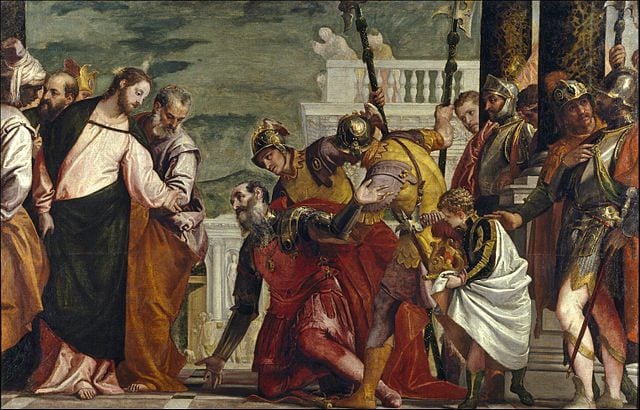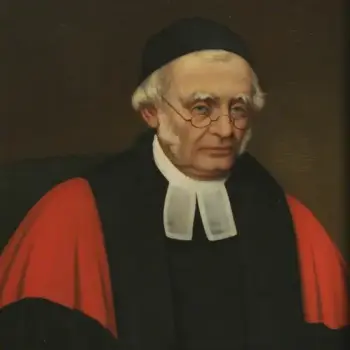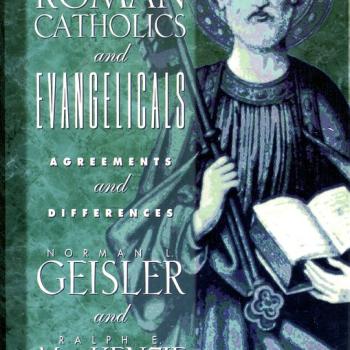
Jesus and the Centurion (c. 1571), by Paolo Veronese (1528-1588). Jesus was quite “ecumenical” with those completely outside the Jewish faith. [public domain / Wikimedia Commons]
***
This is a good dialogue with a Protestant friend, Dustin Buck Lattimore, from my Facebook page. His words will be italicized.
*****
How are they [the Orthodox] not “separated brethren” when they deny all of the Catholic particulars concerning the papacy? I wonder if we (Protestants) will achieve an equal level of friendliness 500 years from now, when we have a nice 1000 year gap from our schism.
Well, y’all gave up a lot more doctrines than the Orthodox did. They mainly gave up indissoluble marriage and the papacy and we disagreed on fairly abstract points of trinitarianism. So it is quite a big difference in terms of what we disagree about.
Fair enough. I’m just observing that there was a lot of rancor (if something as serious anathematization as mere rancor) at the time of each schism, with tempers cooling and relationship being reestablished as time passed. I mean, 1000 years later and RC and EO are practically reunited. 500 years ago Protestants were damned, now we’re separated brethren.
Trent taught the validity of Protestant baptism, while Protestants were saying the pope was antichrist and that Catholics were semi-Pelagian heretics . . .
I never said the anathematization didn’t go both ways. And I do think there is a lot of work to be done within Protestantism to get people to A) acknowledge non-Protestants as legitimate Christians, and B) see reunification as in any way desirable.
The Catholic Church has, for example, cooperated with Campus Crusade for Christ in Poland, and the pro-life movement was so ecumenical that it was the cause of my meeting articulate Catholics, which led me to Catholicism.
If you somehow had come in contact with articulate Catholics nonetheless, do you think you still would have converted? Put another way, do you think you could have left Protestantism for Catholicism if you had lived before Vatican II? I have a theory that the relaxing of attitudes toward Protestants with V2 is a primary reason for the large numbers of Protestant conversions to Catholicism.
Yes, I would have, because the issues don’t change. Development of doctrine is the same issue whether there was a Vatican II or not. So are contraception and the nature of the Protestant Revolution. These were my three main reasons.
Vatican II changed only the approach to Protestants. It’s a manifestation of the Pauline “being all things to all men.” It didn’t change any doctrine. Put most broadly, Protestants are becoming Catholics because of 1) the massive internal contradictions within Protestantism, and 2) the discovery that Catholicism has maintained many aspects of historic (and apostolic and patristic) Christianity that have been ditched by Protestants.
“Separated brethren” as a term isn’t new, either. It dates back to at least 70 years before Vatican II.
Hmm… Thoughts are percolating… Perspective shifting…
Okay, so I had been (and still do) thinking of Roman Catholicism as another denomination. So ‘converting’ to Catholicism is really just changing one’s denomination.
That’s how Protestants view it, because you can’t get out of your own unbiblical paradigm of denominationalism. We see it as a matter of there being only one Church in the Bible. The task, then, is to determine what that is, and where it is (institutionally / historically / ecclesiologically) found. My conversion was changing from one particular Christian worldview or set of beliefs to another one. It was (as I put it) going from “very good” to “best.”
Now correct me if I’m wrong here on VII: before VII, ‘extra ecclesium nulam salus’ was much more strongly understood.
It was much more emphasized, for sure, and ecumenism has much more rapidly developed, post-World War II. But the teaching about salvation outside the Church has not changed [see three posts on this: one / two / three], and there were ecumenical motifs before Vatican II (indeed, in the Bible itself and strongly even in St. Thomas Aquinas). Even the Assisi Ecumenical Gatherings can be grounded in thought that was present in Aquinas. Trent did not anathematize all Protestants, as is often wrongly asserted.
Dominus Iesus (2000), put out by the Congregation for the Doctrine of the Faith (CDF), under Cardinal Ratzinger (later, Pope Benedict XVI), reiterated the doctrine of “no salvation outside the Church.” This surprised a lot of folks only because (like you) they were under the false impression that Vatican II had changed this. Another document from the CDF in 2007, dealt with some of these same issues. I had a good dialogue with a Protestant pastor on these same sorts of issues, in 2007 (allow time for it to upload).
To hear the radtrads I’ve talked to tell it, it was a glorious time when Catholics were right and Protestants were damned.
Yes. This is because they emphasize only one aspect of the total equation, and ignore the ecumenical motifs in Scripture and Aquinas and others, and the acknowledgment of Protestant baptism even in Trent. Trent taught Protestants were partially heretical, but still brethren in Christ by virtue of their baptism. Likewise, Luther and Calvin acknowledged Catholic baptism as valid (neither got rebaptized). They were much more against Anabaptists, whom they wanted killed, than Catholics. Luther was far more opposed to the “damned” Zwingli, who denied the Real Presence, than Catholics, who were still Christians in his opinion. Vatican II emphasizes our very significant common ground with Protestants. The reactionaries lack balanced teaching and misunderstand the Mind of the Church. This is why I wrote a paper (I can’t find it!) about how, if I had met radical Catholic reactionaries rather than a person who understood Vatican II, I wouldn’t have converted when I did (1990).
Now, post-VII, extra ecclesium nulam salus hasn’t been undone per se (salvation is still only through the church aka Roman Catholic church), but Protestants can be connected to the church (through baptism?)
As I explained to you already, Trent recognized Protestant baptism. So what you try to say is some new thing in Vatican II, was already there. Aquinas taught the same, and 800 years earlier, Augustine recognized the validity of schismatic Donatist baptism.
and still be saved, despite rejecting papal authority and all the rest.
We believe that if one truly understands Catholic teaching as true, and rejects it, that they cannot be saved. But of course there is massive, widespread ignorance about what we actually teach, and why. So in a purely subjective sense, there are a lot of “loopholes” involved. God judges us by what we know. Ignorance and lack of knowledge are very different from stiff-necked, hardhearted obstinacy and outright rebelliousness. And we believe that whoever is saved, is saved in some way through the Catholic Church, whether they are aware of it or not.
My entire premise hinges on this understanding of what VII did; if I’m misunderstanding, please correct me (and I know VII did much more than address Protestantism).
You have some incorrect premises, as shown. The whole thing is far more complex, nuanced, and subtle than you are making out.
So, pre-VII, why on earth would you change to a denomination that declared all other denominations heretical and most likely damned?
That’s a caricature of our view, as explained above. Your question doesn’t even make any sense. The person who converts to Catholicism does so because they have come to believe it to be the one true Church of the Bible, established by Our Lord Jesus Christ. It’s a change of rule of faith and view of authority (from sola Scriptura to Bible-Church-Tradition and infallibility of all three) and acceptance of all that Protestants reject (the saints, Mary, purgatory, the papacy, transubstantiation, infused justification, regenerative baptism, penance, absolution, sacramentalism, moral teachings such as contraception and prohibition of divorce, etc.). All of these factors are exactly the same, either before Vatican II or after it.
But post-VII, you are still free to hold your Protestant friends and family as brothers and sisters in Christ.
They always have been, insofar as they are baptized and accept many things that we do (Nicene Creed, etc.).
A stumbling block to conversion has been removed, opening the doors to greater Protestant conversion to Catholicism.
Not really, because one converts to Catholicism from Protestantism due to the recognition of much false teaching within Protestantism, and a “fullness” of historical, biblical, apostolic Christianity present in Catholicism.
However, if I think of it in terms of converting to another religion entirely, I can see how one would have to choose the truth, despite it meaning believing one’s family and friends are damned.
It’s not another religion. It’s one form of Christianity, just as Protestantism is.
It happens all the time when one person in a family converts to Christianity; I wouldn’t dream of telling them “Well, you should really stick with your family on this”, because their eternal destiny is on the line. So I can definitely see one converting to Catholicism if one really believes it to be True, despite the ramifications for one’s family.
It’s the fullness of Christian truth, and going from “very good” Christianity to the “best” and most fully true and error-free version of Christianity.
So again, it seems to me that pre-VII, converting to Catholicism was similar to converting to another faith entire, and after VII it was more like changing to a new denomination (yes, I know Catholics don’t consider themselves a denomination) within the same faith.
It was more so towards that kind of thinking, but not quite in reality.
Here’s how I see it: VII was great because now Catholics can hold Protestants as brothers, which in turn allows Protestants (charitable ones, at least) to hold Catholics as brothers.
Neither thing is anything new at all. Only the strong ecumenical emphasis is new. But even that was only a revival of certain aspects of the teaching of Augustine, Aquinas, and many fathers, and of biblical motifs.
It also deincentivizes me from ever needing to convert to Catholicism, as my eternal destiny is no longer on the line. Even if I’m wrong in my Protestantism, I’m still a member of the body of Christ.
That’s how you can rationalize it in your head if you like. Your eternal destiny would be on the line if you knew that our teaching was true, and you rejected it. If you are curious enough about Catholicism to wonder whether we might be right on various issues that divide us, then you will pursue study of those issues and make a determination. Ask God to reveal to you the truth of these things. It’s all by His grace. He is the One Who opens eyes and hearts. For most of us converts, we started seeing over and over that the Catholic Church had a superior, more biblical and historically plausible, substantiated position (I converted due to moral theology and historical arguments, not biblical arguments). One sees so many of those and then, out of the cumulative effect, they can believe in faith, by God’s grace, that the Catholic Church is what she claims to be. At that point, it is moral and intellectual duty to accept and join it.
I was happy and content as an evangelical. I loved that period of my life and have only find, warm memories of it (and indeed, a strong gratefulness). But I discovered more Christian truth to be had, and I’ve always tried to follow truth wherever it led; so here I am!
Thoughts on my thoughts?
I hope my replies have been thought-provoking!
Thanks for clarifying my misunderstanding of what Vatican II did and did not do. So my salvation would only be on the line if I became convinced by the various historical and exegetical arguments made by the Catholic church and still rejected it? That is to say, as long as I remain unconvinced (as I do), I’m “in the clear”?
If you believe something is true, it then becomes your intellectual duty (being honest with yourself) to believe in it. So the two come together at that point.













